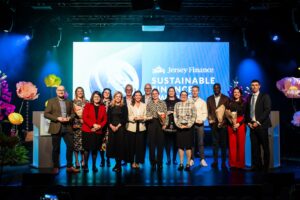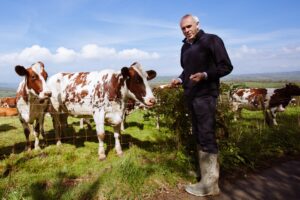
This article is reproduced here by kind permission of the JEP.
The Four Horsemen of the Apocalypse are cantering through the world.
And between them they’ve stolen the mustard. At least, there seems to be no mustard to be had anywhere.
There were three horsemen: Brexit, Covid and War. Then they met up with Climate Warming and asked him if he would care to make up a fourth. Now the four of them are riding in a posse.
It’s not just mustard, although the mustard famine in Jersey is bad enough. Knowing we were going to Saint-Malo for the day, a friend asked us piteously to bring back some Amora mustard. But when we got there, the mustard shelves were all bare: no Amora mustard, no mustard at all.
‘Pas de moutarde. Desolé!’
As compensation, I am giving her my family recipe for home-made mustard, but I fear that that won’t quite – er… cut the mustard.
Then there is the ginger ale famine. Why on earth is there a ginger ale famine? Combine that with the more serious brandy famine, and our evening cocktail hour is becoming a bit spartan.
At the start of the pandemic we had the loo roll famine. I did wonder at the time what people used before loo paper was invented. Locally, tree Mallow or Lavatera (Lavatera arborea) can be useful: I am told (although I cannot recommend it from first hand experience), that the leaves are soft, but they are also strong and don’t tear at the wrong moment. Clumps of it used to be grown in Jersey against the exterior walls of an outside loo, when that was the only toilet facility available in a rural worker’s cottage.
Just be careful that you use the right plant, otherwise you might get an unpleasant rash in an unmentionable place.
My son is more worried about the tomato ketchup famine than the brandy famine. Last autumn I experimented with making hawthorn ketchup. After a few month’s maturation I brought it out of the cupboard like a magician producing a rabbit out of a hat. Unfortunately, it tasted vile and we had to throw it away. Making my own ginger beer was no more successful: I gave some bottles away to friends and family, but they were not impressed when they exploded in their own homes and they thought, until they found the sticky mess and broken glass in their fridges, that it had been caused by a terrorist’s bomb.
Then there is the breakfast cereal famine, the mushroom famine, the ice cream famine, the Steradent famine….
I hope those families in Jersey most affected by rising prices and shortages will not be offended by what they might see as frivolous and uncaring comments on the serious problems of getting by and buying daily provisions to feed a family. The rising price of vital daily necessities is more serious than our own problemettes of having to drink cheaper wine or finding an empty shelf in the supermarket where the bottled water ought to be.
The year 2019 and the New Year of 2020 now seem, in retrospect, like a vision of a distant and fair country; troops in the First World War cowering in dirty, muddy trenches must have looked back on the spring and early summer of 1914 in much the same way, even though, at the time, 2019 did not seem particularly like a happy, arcadian year. Will we ever get back to that blissful era of full shelves and no shortages in the shops and mustard for all? Unfortunately, those Four Horsemen show no sign of finishing their ride and returning their horses to stables.
I do remember – a generation ago, now – asking the Island’s Wise Men of the time about Jersey’s food security preparedness. What if there were some crisis, political or environmental, which would impede the importation of foodstuffs and the ‘just in time’ delivery system to Jersey supermarkets? I was told, in essence, not to worry my dear little head about problems that would never happen. Things look a little different now.
Actually, one can get by well enough without mustard, ketchup and (so I am informed) brandy. But an inability to afford the real essentials of life, or having to rely on handouts from food banks, is an indictment on how badly we have got things wrong.
It is not just humans that are feeling the pinch: a farmer told me recently that the cost of imported cattle fodder had risen 30% to 40% this year. So, we are growing far more cereal in the Island to replace the fodder that we can no longer afford to import. But the recent scorching weather (Climate Change’s contribution to the Four Horsemens’ fun) has done little to help maintain an adequate supply.
To the mantra of ‘local food for local people’, we should add ‘local food for local farm animals’.
At least that farming initiative, however difficult this summer has been, points the right way forward to a more diverse set of local crops to contribute towards local demand, rather than a system heavily skewered towards exporting early potatoes. I do wish all the best to the industry that exports Jersey Royals, but there is so little land available for farming in Jersey, that it might be advisable to reduce the cultivated area by, say, 5% -10% to enable more land to be devoted to more diverse crops and to increase the capacity for lengthier crop rotation periods.
For me, the most exciting news on the farming front is the evident enthusiasm of farmers, smallholders and hobby farmers to experiment – albeit in a small way as yet – with new or local products: Jersey wheat for Jersey bread; Jersey hops for Jersey beer; Jersey beef cattle for Jersey meat; Jersey strawberries rather than imported strawberries from South America; Jersey rhubarb, Jersey watercress Jersey tea…. Perhaps, I venture to hope, even Jersey mustard?
We will never be self-sufficient, but we could be, as an Island, a little more resilient to outside disturbances and shortages.
If I were to venture a prophecy, I would suggest that we must all get used to not having the limitless range of food products with which we have all got familiar in years gone by and also, that we must get used to paying more for what we can buy. Any family counting their pennies and buying, perforce, the cheapest of everything or going without, will not thank me for saying that food has become under-priced in recent decades and that what we are seeing now is an inevitable correction.
To quote Tim Smit, the environmentalist and founder of the Eden Project: ‘Food is ridiculously cheap and we need to pay more – for our environment to be healthy, to cut down on carbon emissions and give more income to our farmers.’
And if I were to be asked: ‘what would you do about rising food costs and shortages?’ my answer would be: to increase agricultural diversification; to experiment with initiatives to allow smallholders to distribute their produce as widely as possible within the Island; to encourage anyone, who can, to ‘grow their own’ rather than rely totally on purchasing everything from the shops; to plant fruit trees in parks and make the fruit free to all comers…. and, also, to plead on bended knee: ‘For God’s sake – stop drowning Island fields in concrete for building development. You can’t eat concrete – and you can’t eat money, either.’





One Response
Good, down to earth (literally) recommendations leavened with welcome humour – an excellent read!